Welcome to this new edition of our Tools for Thought series, where we interview founders on a mission to help us think better and work smarter. Chris Reinberg is the founder of Mindsera, an AI-powered journal designed to train your thinking skills. Mindsera makes thinking with mental models actionable with journaling templates that guide your thought process.
In this interview, we talked about the power of thinking from first principles, building a personal board of advisors, writing as a thinking tool, using mental models to generate personal insights, why we should focus more on inducing quality decisions, and much more. Enjoy the read!
Hi Chris, thanks for agreeing to this interview! You believe in the power of bringing together cognitive psychology with software and design. Can you tell us more?
Thank you for having me. I believe the world’s most valuable skill is clarity of thought. When you start to think about it, thinking is the most powerful tool you can possibly have. Thinking makes you act effectively in the world. It helps you get what you want out of life.
Whenever we want to accomplish something, there are obstacles in our way. Thinking is what sets humans apart as expert problem-solvers who can find solutions to overcome these obstacles. It’s all within our heads.
Thinking made us go from fighting with sticks and stones to smartphones, artificial intelligence, and launching reusable rockets with the mission of becoming a space-faring civilization. That’s quite spectacular.
My own background is kind of a peculiar one. I’ve been a professional mentalist for over ten years. Mentalism, in other words, is the art of getting inside people’s heads. It’s about how to use the biases in our minds to create seemingly impossible feats of mind reading.
That got me obsessed about how the mind works in general. I went from mind reading to mind building and started investigating the thinking habits of geniuses and to what degree it’s possible to optimize the software in our heads.
On one side, we have a mental health crisis; on the other hand, we need to reskill for the future. To succeed, we must become mentally fit, not just mentally healthy. When we look at various research about the essential work skills in the next decade, they all point to cognitive skills like critical thinking, decision-making, problem solving, creativity, self-leadership, mental resilience, and continuous learning. It’s no surprise that these are the same skills that underlie the success of the most accomplished, creative, and prolific people on earth.
So I asked myself, how do you keep yourself mentally healthy and improve your cognitive skills? What would be this piece of software that you can build if you think about it from the first principles?
And this is what inspired you to create an AI-powered journal.
Exactly! Many people do not understand who they are, where they are, or where they are going. In consequence, instead of attempting those actions that would make their lives as valuable as possible, things just happen to them, and they’re often not good.
The antidote to that is becoming thoughtful about your life, and you do that through journaling. Reflecting on your thoughts and feelings makes you understand yourself better, find uncovered self-knowledge, and improve your overall mental health & fitness.
Also, the best way to teach people critical thinking is to teach them to write. There is no difference between writing and thinking. Writing is a sophisticated form of thinking. If you make your thoughts visual with words, it becomes so much easier for your brain to organise information and make sense of things.
Mindsera is kind of a supercharged journal. It analyses your mindset, helps you structure your thinking, and has an integrated AI mentor to explain things, brainstorm, and give actionable advice. It’s a copilot for thinking.
While writing is helpful in and of itself, it can be hard to generate insights from journaling. How does Mindsera address this challenge?
That is a problem a lot of people have. We all know journaling has massive benefits, but how do you do it? The act of sitting down to write can be daunting, and the blank page is a well-known trigger for writer’s block.
Fortunately, there is a solution to that. The human mind is a problem-solving tool. To get the mental juices flowing, all you need to do is ask a question. Questions focus your thinking because every question is a little problem for your mind. Everyone is constantly trying to give you answers, but the reality is you don’t need better answers, you need better questions. The better the questions, the more insightful and robust the answers and possibilities created. So, where do you find good questions?
We all have tried journaling prompts, but the problem with them is that they are too general and get repetitive very fast. This is where our curated list of mental models and frameworks becomes useful.
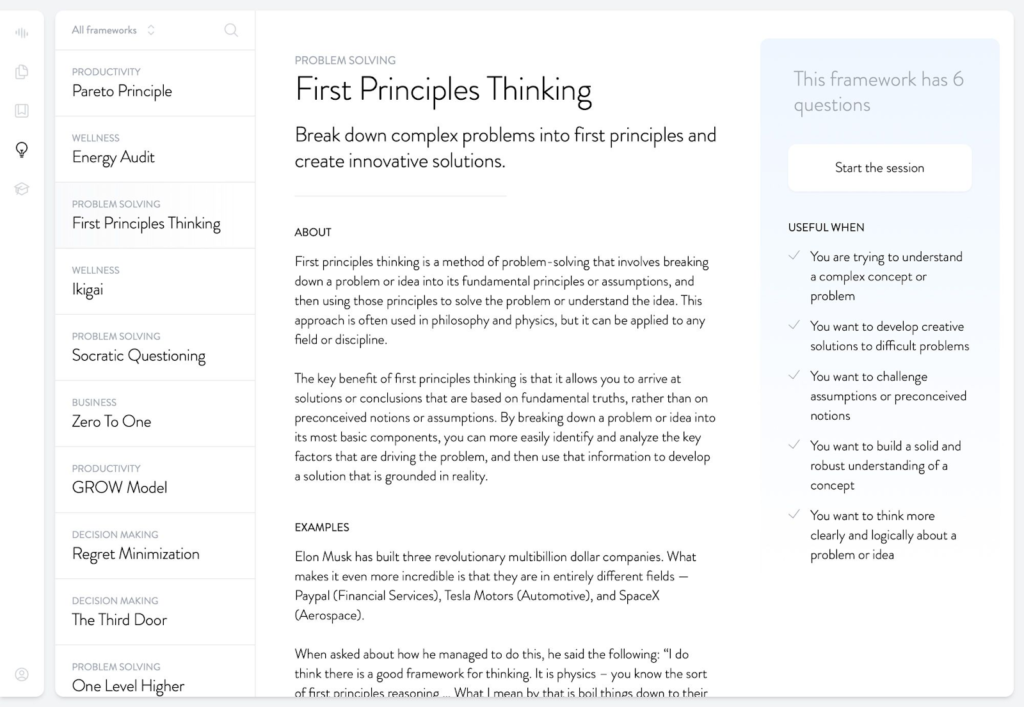
Tiago Forte explained it well: “Our creativity thrives on examples. When we have a template to fill in, our ideas are channelled into useful forms instead of splattered around haphazardly. There are best practices and models for almost anything you want to create.”
But it’s one thing to read about mental models and another to apply them, so we turned the most useful mental models into journaling templates. They make thinking with mental models actionable by guiding your thought process.
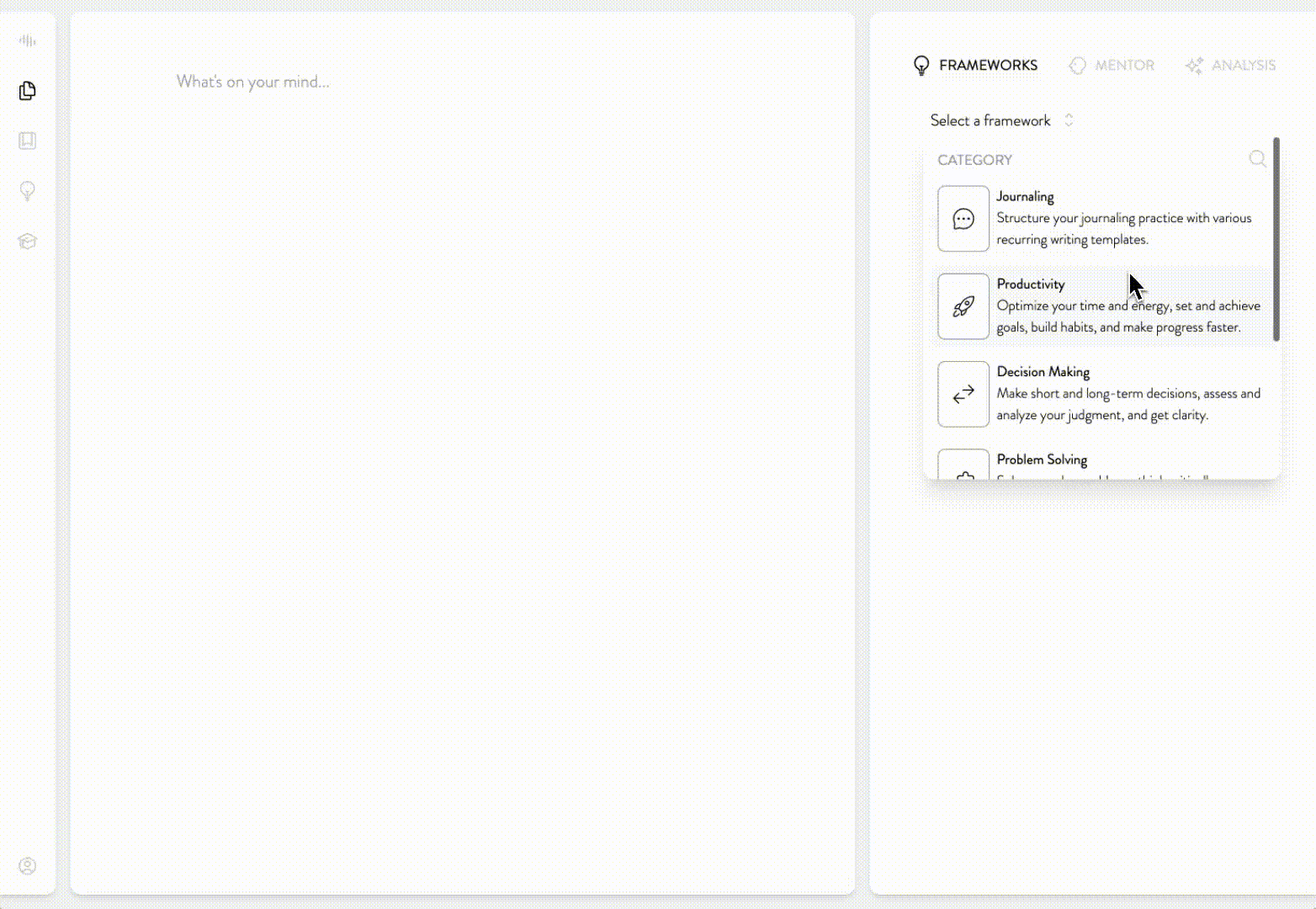
Have a long-term decision you need to make? Use the Regret Minimization frameworks from Jeff Bezos. Want to find purpose and meaning in life? Think with the Ikigai framework. Need to build habits and achieve goals? Well, there are frameworks that help you to do that. We have frameworks for almost every occasion used by the absolute top 1% to make better decisions, solve complex problems, and be more productive.
Some famous people who are vocal about the benefits of clear thinking, mental models, and writing include Elon Musk, Charlie Munger, Warren Buffet, Jeff Bezos, Naval Ravikant, Jordan Peterson, and Paul Graham. You are in good company!
That’s such a powerful feature. Mental models can be a great way to generate insights. Then, the next step in better thinking is to go from insights to decisions.
I’ve always liked this concept of a personal board of advisors. Whenever I have an important decision to make, I tend to go to an imaginary meeting room in my mind. Around the table, there are Socrates, Marcus Aurelius, Steve Jobs, and other great minds. I explain the situation to them and listen to what they have to say. It’s a way to trick myself into seeing things from new perspectives.
Now, thanks to advances in artificial intelligence, you can actually talk with digital minds that imitate the thinking of those cognitive giants, past and present.
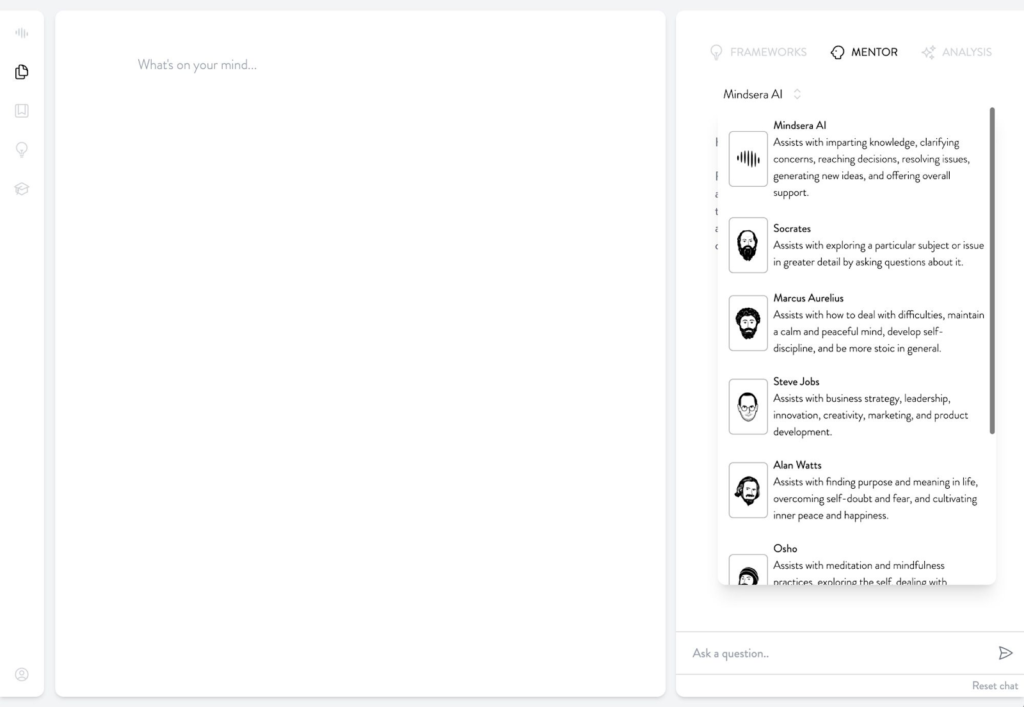
Marcus Aurelius to develop stoic qualities. Elon Musk to build a start-up. Alan Watts to find purpose and meaning in life. Carl Jung to assist in personal growth, and so on. You can have your own personal board of advisors to explain things, brainstorm, and give actionable advice.
Basically, you get the power of a personal coach without paying hundreds of dollars per hour. This makes it accessible to everyone, not just a selected few.
Another exciting feature is “mindset analysis” – can you tell us more?
This is something I’m personally very excited about. I have always thought, what would happen if you write all of your experiences and reasoning into a personal journal and then give it to the world’s top psychologists, entrepreneurs, and philosophers to assess? What insights could they distil for you, and how beneficial would that be?
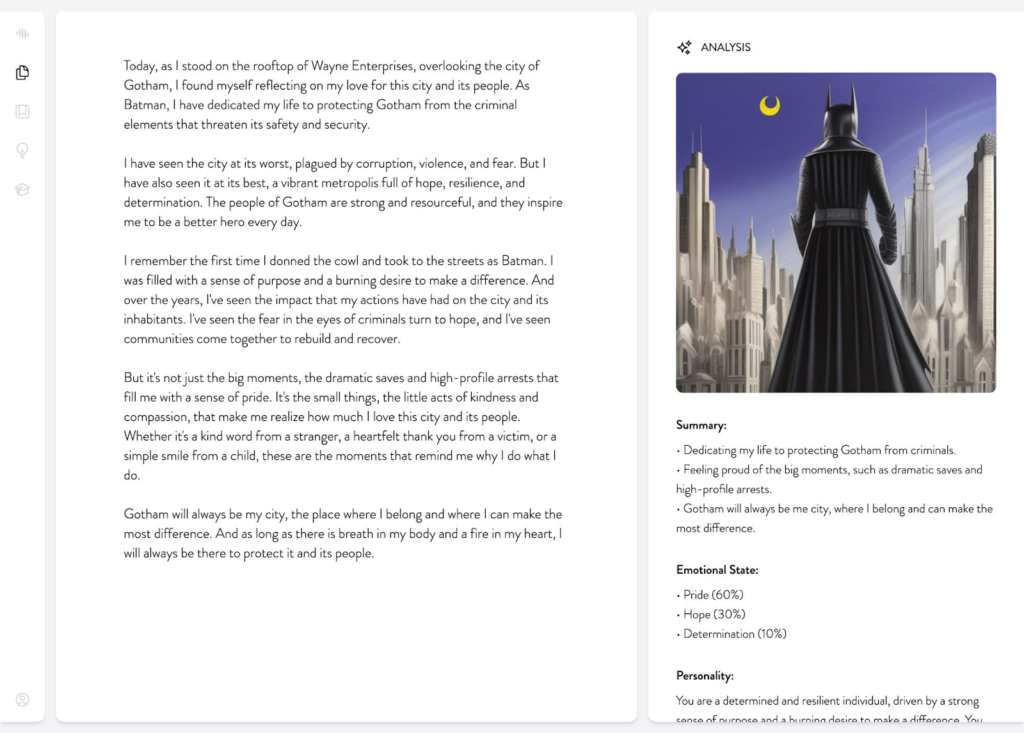
Now with AI, it’s possible. When you finish your journaling session on Mindsera, click analyse. The mindset analysis measures your emotional state, gives a percentage to each emotion, reflects on your personality, and provides you with a list of personalised suggestions.
One of our user’s favourite features is the original artwork generated based on your journaling entry. I’m always excited to write my thoughts down because I want to see the visualisation of those thoughts. It’s a really great incentive for positive habit-building and kind of feels like magic.
I find the act of creating generative art from personal thoughts gives meaning to the resulting images. It also makes journaling social, as you can share the artwork with your friends. So, each time you sit down to write, you build up a personal art gallery of your mind.
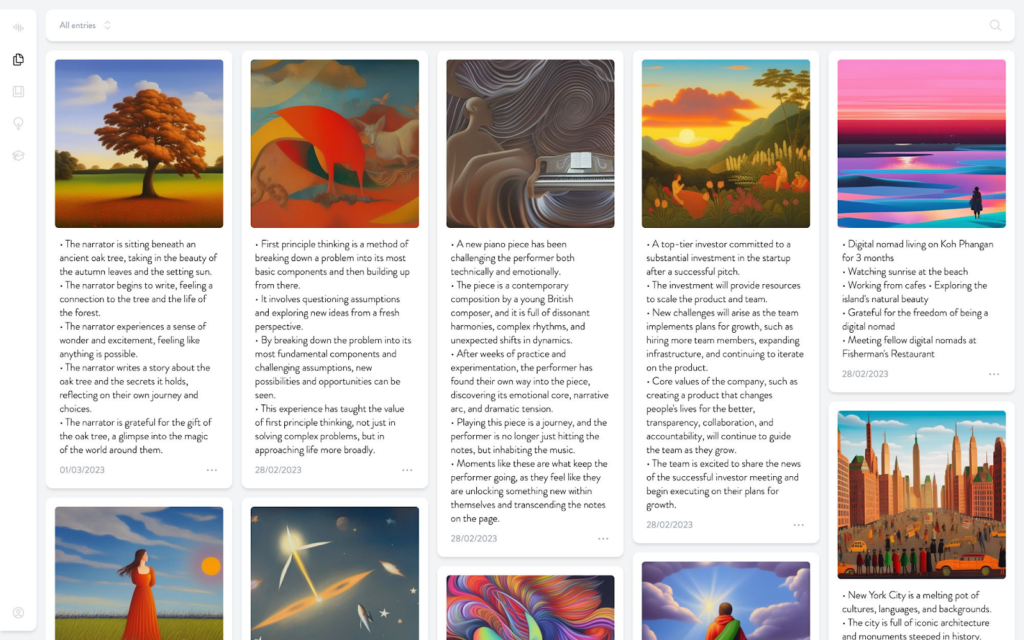
Also, I want to stress that we are big believers in freedom and privacy of thought. We are an independent company and do not sell your data or see what you have written. With the latest privacy update from OpenAI, your data will also not be used to train future AI models, so Mindsera truly is a private space for your thoughts.
What kind of people use Mindsera?
Just like people who go to the gym care about their physical health and fitness, people who use Mindsera care about their mental health and cognitive fitness. They understand the importance of keeping their minds sharp and agile, just as athletes understand the importance of keeping their bodies in top shape.
Most of our users tend to be some kind of makers – startup founders, solopreneurs, indie hackers, digital creators, and investors. The most important asset you have as an entrepreneur is your mind, so improving your cognitive skills is the single most powerful thing you can do.
It makes you better at solving problems, navigating uncertainty, making decisions, managing stress, and staying focused and productive.
What about you, how do you use Mindsera?
Mindsera, for me, is all about staying in a state of clarity. It’s the most powerful thing. When you operate from a place of clarity and intention, your thoughts and actions have leverage.
Success in life depends on your ability to make good decisions. The quality of your decisions depends on the quality of your thoughts. Having a clear mind means emotions do not cloud your thinking. That’s the main benefit I get from Mindsera.
I usually journal twice a day. In the morning, my journaling practice consists mainly of stream-of-consciousness writing and clearing my mind for the day. It helps me to be thoughtful about my time and own my attention. In the evening, I review my day in a similar manner.
I think of it as my daily mental health workout. Mindset is just habits in your head, you know.
Whenever I write and come up with a valuable insight, I use the highlights feature. I highlight the part so it appears under my highlights. That is where my top 1% of ideas live. Some of them I tweet or expand into essays.
When I’m stuck or need a little bit of extra input, I go to frameworks or use the AI mentor. I’m also kind of addicted to seeing my mind visualised with the generated artworks. Scrolling through my journal is like watching a movie about my life. There are also bullet point summaries for each journaling entry that give you an easy overview of your thoughts in time. That is good for recognizing recurring topics and patterns in your thinking.
How do you recommend someone get started?
In the beginning, journaling is all about building a habit. Start with a 7-day journaling challenge. Write daily. You can use various journaling frameworks that give structure to your journaling practice and make it easy to start and maintain the habit. Explore the list of frameworks. See what sparks your curiosity, and go from there.
We also built a habit tracker that measures your total writing time, as well as your current and longest streak. One of our main goals is to help you build a positive habit. The feedback loop and gamification help a lot with that.
Like every activity, journaling becomes better the more you do it. I think Naval Ravikant said that journaling is meditation on paper. You feel the benefits of one session, but the real growth happens over time.
And finally… What’s next for Mindsera?
First, we are going to focus heavily on mental health. For the first time, mental health has ranked higher than cancer when people are asked to think about top health concerns. Automation through robotics and AI will only accelerate it. It’s one of the most pressing and concerning issues in the world.
Research has shown that journaling has a lot of positive and therapeutic effects on our mental well-being. I find it to be the best tool for improving your life in almost every area. We also must train our thinking skills to operate in this new and uncertain environment. But you can’t get fit before you become healthy.
There are a lot of ideas. Some of them can feel like they are from a science fiction book. For example, we are working on something called transcendence. Basically, you can train a large language model using your journaling entries to create a chatbot based on yourself. In addition to being able to talk with yourself, you can send your digital mind to have lengthy conversations with famous historical figures and discover highly-personalised insights for you.
Imagine going to bed while your digital mind engages in hour-long conversations with great minds like Marcus Aurelius, Socrates, and Buddha, all while you are asleep. In the morning, you get an overview of the main insights generated. This will soon be possible, so it’s a great idea to start journaling now.
Our overarching goal is to create a mental health and fitness platform, which we envision as a gym for the mind. We operate under three guiding principles. First, progress comes from reflection, not experience. Second, we must learn foremost how to think, not what to think. And lastly, AI should not make decisions for you but should help you to make better decisions.
By becoming clear thinkers, we can tackle the major problems facing us today and improve the quality of life, reduce suffering, advance the human race, and change the world for the better.
Thank you so much for your time, Chris! Where can people learn more about Mindsera?
Thank you, Anne-Laure! You can learn more about Mindsera at mindsera.com, and I’m happy to connect with like-minded people on Twitter.
